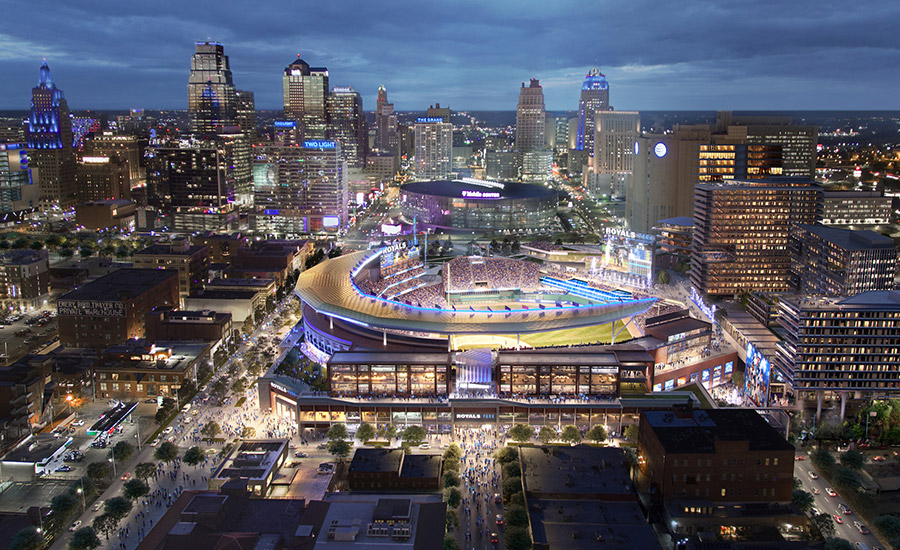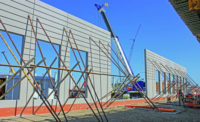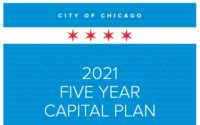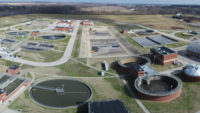Voters in Jackson County, Mo., will go to the polls April 2 on a proposal to extend a current 3/8th-cent sales tax to help pay for demolishing and replacing 51-year-old Kauffman Stadium, home to the Kansas City Royals, and to fund the renovation of its neighbor, Arrowhead Stadium, where the Super Bowl-winning Kansas City Chiefs play.
Major League Baseball's Royals want to create a $2-billion park district in the Crossroads District. A new stadium, which would seat 34,000, would occupy the site of the former Kansas City Star building. It would feature an adjacent development with office, residential and retail space and a hotel.
The Chiefs' plan, however, is for an $800-million renovation of Arrowhead Stadium including a turf-covered zone with tailgate areas and a covered entertainment center built on the current site of Kauffman Stadium, a new upper concourse connection bridge, new stadium amenities, retail spaces and restrooms, an access tunnel, three new pedestrian bridges and a new parking deck.
Both teams support the sales tax extension. The sales tax extension "is better for everybody and keeps the two teams in the region," Mark Donovan, president of the Chiefs, said in a distributed interview.
The Royals, who’ve played at Kauffman since 1973, assert that a new stadium is needed because Kauffman's concrete is deteriorating and can't be rehabilitated.
Earl Santee, a senior principal at Populous, the Kansas City-based architect-engineer hired to design both stadiums, said in a press conference that it believes it is no longer feasible to maintain Kauffman Stadium.
“I’ve been working at the K since the 1990s,” he said. “We’ve renovated it. We’ve maintained it. We’ve sustained it. But renovating the K going forward is just not feasible. It’s not realistic."
Populous consulted with a structural engineer to evaluate the Kauffman stadium but Santee did not name the firm.
“[The forensic firm] came in and identified the first phase" of alkali-silica reaction that causes the concrete to fail at some point, says Santee. It might take 40 years, but the concrete "is going to fail at some point so the ability to maintain the current structure is not really feasible,” Santee adds.
New York City-based structural engineer Thornton Tomasetti reviewed the structural assessment portion of the most recent report, which was done in 2022, and which did not include concrete testing, says Sarah Dempster, a Populous principal. A separate assessment in 2007 provided concrete materials testing by a different consulting group.
"That report indicated alkali–silica reaction (ASR) in 57 out of 59 cores examined, with the majority of the structure characterized as having moderate ASR distress," Dempster says. "Mitigation was attempted and unsuccessful."
ASR is a chemical reaction occurring between the reactive siliceous aggregate particles and hydroxyl ions of the pore solution in hardened concrete. She added that the 2007 report estimated that the concrete would last 10 to 20 years before distress on it accelerates to a point where replacement becomes necessary.
Noting that the stadiums, which are both part of the Truman Sports Complex, are about the same age, Jackson County Executive Frank White sent a letter to the Jackson County Sports Authority, which leases the stadiums to the teams, questioning why Kauffman has what he called "concrete cancer" when Arrowhead does not. He also asked for further assessment of the conditions at both stadiums.
“This assertion [of concrete cancer] raises significant questions, particularly as the Jackson County Sports Authority’s annual facility report has made no mention of ASR or similar related construction concerns,” White wrote.
While the Royals maintain that ASR is an issue, the sports authority contracted with Burns & McDonnell between 2014 and 2022 to annually assess conditions at both stadiums. The most recent report in 2022 found that Kauffman was in “satisfactory condition” consistent with a first-class major league baseball stadium.
Burns & McDonnell declined to comment on the report.
In a letter responding to White’s concerns, Shawn Foster, chairman of the sports authority, noted that the the Kansas City Royals made a cost/value business decision that it would cost the same amount of monies to maintain and renovate Kauffman Stadium for the next 25 to 40 years as it would cost to build a new stadium. "This is a business decision, which the team believes will provide a better game day experience, be more operationally efficient and allow them different streams of revenue,” said Foster.






Post a comment to this article
Report Abusive Comment